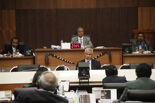Prime Minister's "Reflection on the State of the Nation" at the National Parliament

Prime Minister Xanana Gusmão was, invited to present his "Reflection on the State of the Nation" on July 12th, to the National Parliament. This was the first ceremony exclusively devoted to this topic.
Xanana Gusmão recalled the very beginning of the State "which practically began from scratch in all aspects, from a lack of experience in governance, and in human and financial resources, from the void of laws to the present democratic experience, from the existing infrastructures to the ability to rebuild them, from the shortage of institutions to the ability to respond to the country's needs."
The State-building process is a difficult one, which was conditioned by internal problems from the political, economic and social spectrum, while the State's efforts was channeled towards the construction of the society and the Nation: internal reconciliation, society's civic education as well as the State's obligations towards the people and the Nation.
According to Xanana Gusmão, the construction of the State required institutional reforms, economic growth, human development and international relations.
Within the required institutional reforms, are included among others, the crucial reforms in the defense and security sectors, which enabled to empower and professionalize the Defense Forces and the National Police. The State management and administration reforms allowed the development of a more professional, competent and non-partisan public sector, regarding good governance and transparency.
Economic growth is another indicator favoring national development, provided it is ruled according to inclusion and equity principles. The Prime Minister points out the tax reform, the Referendum Package, the decentralization programs, among others, which beyond stimulating entrepreneurship, favor private business investment, drive the economy and create wealth and jobs across the country, while the State guarantees that inflation does not trigger wildly. The State's concern is also that the economy will not only depend on oil, but may be driven by it so that traditional sectors such as agriculture, livestock and fisheries may diversify and increase the national productivity, while focusing on the international market.
The Infrastructure Fund and the Strategic Development Plan, as well as other mechanisms, reflect the investment made to improve basic infrastructures, which will contribute to improve the living standard of the population, and allow for the integrated development of all sectors, including healthcare and education, combining economic growth with sustainable growth.
"The main objective of the Timorese State is to continuously promote the improvement of the quality of life of the Timorese population and their personal development".
The Fund for Human Capital Development, is evidence of this intention, and was created to develop the human resources in Timor-Leste as well as the commitment to achieve the Millennium Development Goals in the areas of poverty, malnutrition, education, health, gender equality and environment sustainability.
Among others, progress in the health and education areas may be measured by the reduction in the infant mortality rates, by the investment placed in training doctors and health technicians, and by the increasing numbers of enrolled children. The improvement of the judicial system and widespread access to justice, including the rehabilitation of infrastructures and the strengthening of the legal framework, show the considerable improvements in the area of justice.
International relations are another important aspect in the construction of the State of the Nation. Regarding this theme, the Prime Minister emphasized "the internal struggle to consolidate our institutions and our economy will also allow, as it has been happening the change in the image that our international partners have of our country" and "in the field of international and multilateral relations, Timor-Leste has developed a foreign policy of good neighborhood, respect for the sovereignty and integrity of Nations and cooperation with mutual benefits".
Besides the Prime Minister, parliamentary leaders from the Frente Mudança, the Democratic Party, the CNRT and FRETILIN, also spoke. They focused mainly in the areas that are the pillars of the country's development, stressing, "the people's wishes are that their life quality does improve".










































